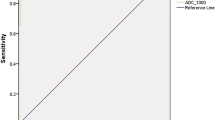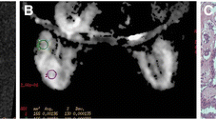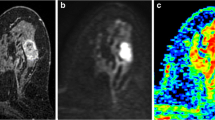Abstract
The role of diffusion-weighted magnetic resonance imaging (DWI) to differentiate breast lesions in vivo was evaluated. Sixty women (mean age, 53 years) with 81 breast lesions were enrolled. A coronal echo planar imaging (EPI) sequence sensitised to diffusion (b value=1,000 s/mm2) was added to standard MR. The mean diffusivity (MD) was calculated. Differences in MD among cysts, benign lesions and malignant lesions were evaluated, and the sensitivity and specificity of DWI to diagnose malignant and benign lesions were calculated. The diagnosis was 18 cysts, 21 benign and 42 malignant nodules. MD values (mean±SD ×10−3 mm2/s) were (1.48±0.37) for benign lesions, (0.95±0.18) for malignant lesions and (2.25±0.26) for cysts. Different MD values characterized different malignant breast lesion types. A MD threshold value of 1.1×10−3 mm2/s discriminated malignant breast lesions from benign lesions with a specificity of 81% and sensitivity of 80%. Choosing a cut-off of 1.31×10−3 mm2/s (MD of malignant lesions -2 SD), the specificity would be 67% with a sensitivity of 100%. Thus, MD values, related to tumor cellularity, provide reliable information to differentiate malignant breast lesions from benign ones. Quantitative DWI is not time-consuming and can be easily inserted into standard clinical breast MR imaging protocols.







Similar content being viewed by others
References
Swedish Organised Service Screening Evaluation Group (2006) Reduction in breast cancer mortality from the organised service screening with mammography: validation with alternative analytic methods. Cancer Epidemiol Biomarkers Prev 15:52–56
Taplin SH, Rutter CM, Elmore JG, Seger D, White D, Brenner RJ (2000) Accuracy of screening mammography using single versus independent double interpretation. AJR Am J Roentgenol 174:1257–1262
Cole EB, Pisano ED, Kistner EO, Muller KE, Brown ME, Feig SA, Jong RA, Maidment ADA, Staiger MJ, Kuzmiak SM, Freimanis RI, Lesko N, Rosen EL, Walsh R, Williford M, Braeuning MP (2003) Diagnostic accuracy of digital mammography in patients with dense breasts who underwent problem-solving mammography: effects of image processing and lesion type. Radiology 226:153–160
Nunes LW, Schnall MD, Orel SG (2001) Update of breast MR imaging architectural interpretation model. Radiology 219:484–494
Jacobs MA, Barker PB, Bluemke DA, Maranto C, Arnold A, Herskovits EH, Bhujwalla Z (2003) Benign and malignant breast lesions: diagnosis with multiparametric MR imaging. Radiology 229:225–232
Huang W, Fisher PR, Dulaimy K, Tudorica LA, O’Hea B, Button (2004) Detection of breast malignancy: diagnostic MR protocol for improved specificity. Radiology 232:585–591
Pediconi F, Catalano C, Occhiato R, Venditti F, Fraioli F, Napoli A, Kirchin MA, Passariello R (2005) Breast lesion detection and characterization at contrast-enhanced MR mammography: gadobenate dimeglumine versus gadopentetate dimeglumine. Radiology 237:45–56
Preda A, Novikov V, Moglich M, Floyd E, Turetschek K, Shames DM, Roberts TP, Corot C, Carter WO, Brasch RC (2005) Magnetic resonance characterization of tumor microvessels in experimental breast tumors using a slow clearance blood pool contrast agent (carboxymethyldextran-A2-Gd-DOTA) with histopathological correlation. Eur Radiol 15:2268–2275
Morakkabati-Spitz N, Leutner C, Schild H, Traeber F, Kuhl C (2005) Diagnostic usefulness of segmental and linear enhancement in dynamic breast MRI. Eur Radiol 15:2010–2017
Oshida K, Nagashima T, Ueda T, Yagata H, Tanabe N, Nakano S, Nikaidou T, Funatsu H, Hashimoto H, Miyazaki M (2005) Pharmacokinetic analysis of ductal carcinoma in situ of the breast using dynamic MR mammography. Eur Radiol 15:1353–1360
Basser PJ, Mattiello J, Le Bihan D (1994) Estimation of the effective self-diffusion tensor from the NMR spin-echo. J Magn Reson B 103:247–254
Le Bihan, Mangin Jf, Poupon C, Clark CA, Pappata S, Molko N, Chabriat H (2001) Diffusion tensor imaging: concepts and applications. J magn Reson Imaging 13:534–546
Cosottini M, Giannelli M, Siciliano G, Lazzarotti G, Michelassi MC, Del Corona A, Bartolozzi C, Murri L (2005) Diffusion-tensor MR imaging of corticospinal tract in amyotrophic lateral sclerosis and progressive muscular atrophy. Radiology 237:258–264
Basser PJ, Jones DK (2002) Diffusion-tensor MRI: theory, experimental design and data analysis. NMR Biomed 15:456–467
Neil J, Miller J, Mukherjee P, Huppi S (2002) Diffusion tensor imaging of normal and injured developing human brain—a technical review. NMR Biomed 15:543–552
Lu S, Ahn D, Johnson G, Law M, Zagzag D, Grossman RI (2004) Diffusion-tensor MR imaging of intracranial neoplasia and associated peritumoral edema: introduction of the tumor infiltration index. Radiology 232:221–228
Hamstra DA, Chenevert TL, Moffat BA, Johnson TD, Meyer CR, Mukherji SK, Quint DJ, Gebarski SS, Fan X, Tsien CI, Lawrence TS, Junck L, Rehemtulla A, Ross BD (2005) Evaluation of the functional diffusion map as an early biomarker of time-to-progression and overall survival in high-grade glioma. Proc Natl Acad Sci USA 102:16759–16764
Bukte Y, Paksoy Y, Genc E, Uca AU (2005) Role of diffusion-weighted MR in differential diagnosis of intracranial cystic lesions. Clin Radiol 60:375–383
Taouli B, Vilgrain V, Dumont E, Daire JL, Fan B, Menu Y (2003) Evaluation of liver diffusion isotropy and characterization of focal hepatic lesions with two single-shot echo-planar MR imaging sequences: prospective study in 66 patients. Radiology 226:71–78
Sumi M, Takagi Y, Uetani M et al (2002) Diffusion-weighted echoplanar MR imaging of the salivary glands. AJR Am J Roentgenol 178:959–965
Nagata S, Nishimura H, Uchida M, Hayabuchi N (2005) Usefulness of diffusion-weighted MRI in differentiating benign from malignant musculoskeletal tumors. Nippon Igaku Hoshasen Gakkai Zasshi 65:30–36
Woodhams R, Matsunaga K, Iwabuchi K, Kan S, Hata H, Kuranami M, Watanabe M, Hayakawa K (2005) Diffusion-weighted imaging of malignant breast tumors: the usefulness of apparent diffusion coefficient (ADC) value and ADC map for the detection of malignant breast tumors and evalution of cancer extension. J Comput Assist Tomogr 29:644–649
Sinha S, Lucas-Quesada FA, Sinha U, DeBruhl N, Bassett LW (2002) In vivo diffusion-weighted MRI of the breast: potential for lesion characterization. J Magn Reson Imaging 15:693–704
Guo Y, Cai YQ, Cai ZL, Gao YG, An NY, Ma L, Mahankali S, Gao JH (2002) Differentiation of clinically benign and malignant breast lesions using diffusion-weighted imaging. J Magn Reson Imaging 16:172–178
Kinoshita T, Yashiro N, Ihara N, Funatu H, Fukum E, Narita M (2002) Diffusion-weighted half-fourier single-shot turbo spin echo imaging in breasr tumors: differentiation of invasive ductal carcinoma from fibroadenoma. J Comput Assist Tomogr 26:1042–1046
Stejskal EO, Tanner JE (1965) Spin diffusion measurements: spin echoes in the presence of a time dependent field gradient. J Chem Phys 42:288–292
Le Bihan D, Poupon C, Amadon A, Lethimonnier F (2006) Artifacts and pitfalls in diffusion MRI. J Magn Reson Imaging 24:478–488
Browner WS, Newman TB (1987) Are all significant P values created equal? The analogy between diagnostic tests and clinical research. JAMA 257:2459–2463
Glantz SA (2005) Primer of biostatistics. Appleton and Lange,Norwalk
Pagano M, Gauvreau K (1999) Principles of biostatistics. Duxbury, Pacific Grove
Beaulieu C (2002) The basis of anisotropic water diffusion in the nervous system—a technical review. NMR Biomed 15:435–455
Norris DG (2001) The effects of microscopic tissue parameters on the diffusion weighted magnetic resonance imaging experiment. NMR Biomed 14:77–93
Englander SA, Ulug AM, Brem R et al (1997) Diffusion imaging of human breast. NMR Biomed 10:348–352
Partridge SC, McKinnon GC, Henry RG, Hylton NM (2001) Menstrual cycle variation of apparent diffusion coefficients measeured in the normal breast using MRI. J Magn Res Imaging 14:433–438
Woodhams R, Matzunaga K, Kan S, Hata H, Ozaki M, Iwabuchi K, Kuranami M, Watanabe M, Hayakawa K (2005) ADC Mapping of benign and malignant breast tumors. Magn Res Med Sci 4:35–42
Le Bihan D (1995) Diffusion and perfusion magnetic resonance imaging. Mal Vasc 20:203–214
Tavassoli FA (1992) Papillary lesions. In: Tavassoli FA (ed) Pathology of the breast. Appleton and Lange, Norwalk, pp 193–227
Haagensen CD, Stout AP, Phillips JS (1951) Papillary neoplasms of the breast. I. Benign intraductal papilloma. Ann Surg 133:18–36
Mercado CL, Hamela-Bena D, Singer C et al (2001) Papillary lesions of the breast: evaluation with stereotactic directional vacuum-assisted biopsy. Radiology 221:650–655
Liberman L, Bracero N, Vuolo MA et al (1999) Percutaneous large-core biopsy of papillary breast lesions. AJR Am J Roentgenol 172:331–337
Mercado CL, Hamele-Bena D, Oken S M, Singer CI, Cangiarella J (2006) Papillary lesions of the breast at percutaneous core-needle biopsy. Radiology 238:801–808
Jacquemier J, Padovani L, Rabayrol L, Lakhani SR, Penault-Llorca F, Denoux Y, Fiche M, Figueiro P, Maisongrosse V, Ledoussal V, Martinez Penuela J, Udvarhely N, El Makdissi G, Ginestier C, Geneix J, Charafe-Jauffret E, Xerri L, Eisinger F, Birnbaum D, Sobol H-European Working Group for Breast Screening Pathology; Breast Cancer Linkage Consortium (2005) Typical medullary breast carcinomas have a basal/myoepithelial phenotype. J Pathol 207:260–268
Rubesova E, Grell AS, De Maertelaer V, Metens T, Chao SL, Lemort M (2006) Quantitative diffusion imaging in breast cancer: a clinical prospective study. J Magn Reson Imaging. 24:319–324
Author information
Authors and Affiliations
Corresponding author
Rights and permissions
About this article
Cite this article
Marini, C., Iacconi, C., Giannelli, M. et al. Quantitative diffusion-weighted MR imaging in the differential diagnosis of breast lesion. Eur Radiol 17, 2646–2655 (2007). https://doi.org/10.1007/s00330-007-0621-2
Received:
Revised:
Accepted:
Published:
Issue Date:
DOI: https://doi.org/10.1007/s00330-007-0621-2




